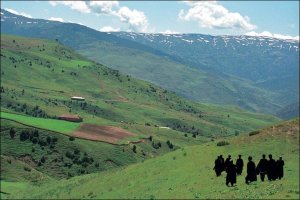 |
| Photo by Umida Akhedova. Imagine those guys in the bottom right as your PCs. |
As I've mentioned a few times, the setting of ATWC is (loosely) inspired by the history and geography of central Asia. I think everything in it would still work if you relocated it to a standard generic vaguely European fantasyland; but if you don't, there are a few things to bear in mind about the differences between central Asia and the western European nations which form the blueprint for most fantasy settings. So:
1: Distances are enormous
Let me just emphasise this: central Asia is huge. If you're in the middle of the steppe, and you pick a direction, and you ride all day and you ride all night, you know where you'll be? That's right: still in the middle of the goddamn steppe. Travel times are measured in weeks, months, and occasionally years. As a result of this, trying to find a single site amidst all this empty immensity is like trying to find a needle in a haystack: unless it's on a major landmark (on the top of a large mountain, at the fork of a major river, by the side of an important road), you're simply never going to be able to locate it unless you have someone with you who really knows the territory.
2: The landscape is unforgiving
It's not lethal. We're not talking about Death Valley or the wilds of Iceland or the middle of the Sahara Desert, where if you wander off without proper preparation you can easily be dead within 24 hours. But the steppe and the desert and the mountains and the taiga are... hard. The wind is strong. The nights are cold. Sources of food, water, and shelter can be few and far between. An unprepared traveller probably won't die on the first night, or the second, but sooner or later the combination of cold and hunger and exposure will wear them down.
3: Horses are not optional
This is a natural consequence of 1 and 2. In a lot of fantasy games, horses are a kind of added convenience: they mean that you can get from A to B in two days instead of four, but really, who cares about travel times? Spend the money on extra weapons instead! In a central Asian setting, though, where the landscape is huge and open and relatively flat, horses make an enormous difference: a journey which would be nightmarish on foot becomes manageable on horseback, not just because it's faster, but also because it matters less to the rider if sources of water or shelter are many miles apart. All ATWC characters start play with horses for a reason, and are assumed to be proficient at riding in much the same way that they are assumed to be proficient at breathing.
4: Authority is decentralised
Imagine trying to run a heavily-centralised empire so huge that it could take several months for a messenger to travel from the capital to the frontier and back. As soon as the first real crisis hit, you'd have two options: give up on the centralisation, or give up on the empire. You can't afford to keep all the military and administrative authority hoarded up in the capital, because by the time you're able to respond to news from the frontier, your border garrisons have all already fallen to the enemy and your frontier territories have been subjected to months of looting and occupation. You need to have regional governors on the ground with all the authority and resources they need to deal with a full range of situations, and that means that they're usually going to behave more like local kings than government officials, because in practise that's pretty much what they are. This also means that rebellions (either of the open 'I declare myself a king' kind, or the de facto 'I'm just going to start treating my orders as optional suggestions' kind) happen all the time, creating a background hum of low-level political instability which is rife with opportunities for adventure.
* * *
Personally, I feel that all of these are positive things from the perspective of fantasy gaming. Enormous, lightly-settled landscapes make the presence of weird creatures and lost ruins more credible than just dropping them into a wood halfway between fantasy-Cambridge and fantasy-London. ('There's a whole tribe of monsters living in here? Wow. You'd think someone would have noticed!') Harsh landscapes, as well as providing suitably inspiring backdrops for adventure, keep things from getting too comfortable: you can't just strike out into the wilderness with five friends, ten hirelings, and twenty horses and assume that you'll all be able to live off the land. Decentralised authority solves the 'we call in the cops' problem: your characters might love to hand whatever horrible problem they've just stumbled into over to the proper authorities, but the proper authorities are months away, and the local governor has one regiment of horsemen with which to keep order in an area the size of France. All in all, the net effect should be to foster a sense of sturdy self-reliance in PCs: an awareness that if they don't solve the problem, or find the lost temple, or even work out how to gather enough food to complete the journey, then no-one else is going to do it for them. I happen to think that's rather a good thing.
No comments:
Post a Comment